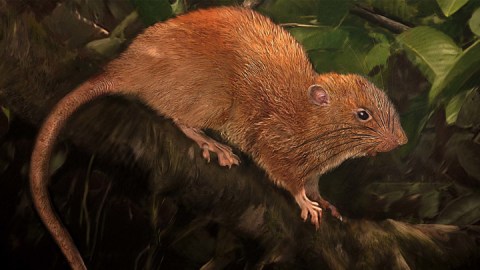A Mysterious Rodent Falls From a Tree and Into Our Lives

Locals of Vangunu, a 210-square-mile Solomon Island, had been trying to convince biologists for some time that there was some kind of oversized rodent living in their trees. A rat so big it could crack open coconuts with its teeth. They called it “Vika.”

What could have done this? (TYRONE LAVERY, FIELD MUSEUM)
The tales caught the interest of one biologist in 2010, Tyrone Lavery of Queensland Museum and Chicago’s Field Museum — after all, half of the mammals in the Solomon Islands are found nowhere else. But he could never quite catch a glimpse of the possibly-mythical creature. Lavery recalls, “If you’re looking for something that lives on the ground, you’re only looking in two dimensions, left to right and forward and backward. If you’re looking for something that can live in 30-foot-tall trees, then there’s a whole new dimension that you need to search.”

Solomon Islands (GOOGLE EARTH)
Lumber is a big industry on Vangunu, with only about 30 square miles of lowland forest remaining. There’s still logging, though, in the small village of Zaira, and when one 30-foot-tall tree came down in 2015, it contained a surprise: a giant, possum-sized rat was in it. The rat didn’t survive the fall, but local ranger Hikuna Judge saw what happened and raced over to retrieve the mysterious corpse. Never having seen anything like it — it was four times bigger than a typical urban rat — he got it to the Queensland Museum in Australia for identification, and to a waiting Lavery.
After performing morphological and genetic analyses to identify the specimen, Lavery declared it a new species altogether, Uromys vika. “It’s the first rat discovered in 80 years from Solomons, and it’s not like people haven’t been trying—it was just so hard to find,” says Lavery. Uromys vika made its public debut on September 27 in the Journal of Mammalogy.

Uromys vika (LAVERY)
Unfortunately, since the rat seems to require a rainforest ecosystem, the deforestation of Vangunu means that on the day it was introduced to the world, Vika was already endangered. Lavery says, “It’s getting to the stage for this rat that, if we hadn’t discovered it now, it might never have gotten discovered. The area where it was found is one of the only places left with forest that hasn’t been logged. It’s really urgent for us to be able to document this rat and find additional support for the Zaira Conservation Area on Vangunu where the rat lives.”

(PEGGY MACNAMARA, FIELD MUSEUM)




